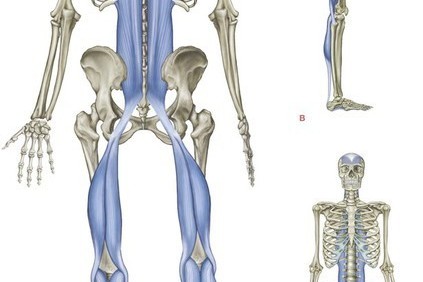What on earth is fascia, and should I be worried!?
Posted Jun 01, 2021 at 15:55
Posted Jun 01, 2021 at 15:55

At our Myofascial visit we talk a lot about fascia. And normally I try to put in simple words what it is and how it works.
Historically fascia has been ignored and only small parts, such plantar or thoracolumbar fascia, of the extensive system were recognised. The fact is however that fascia are present throughout the entire body, covering not only muscles but also joints, bones, nerves, and organs.
Defining fascia is still work in progress and there can be different definitions in circulation. The one that comes the closest to explaining not only its anatomy but also function is one created by Dr Guimberteau which in simple terms says that fascia is the tension fibril network within the body, extending from the surface of the skin to the nucleus of the cell. It is a global network that is mobile and adaptable. It is a connective tissue that is all over and within the body.
The deep fascia separates muscles, creates sheaths for the nerves and vessels, envelopes organs and glands, it is present around joints and ligaments.
Then we have the fascia that encloses the individual muscles and continues with the tendons which is called epimysium which then connects to the periosteum which is the outer layer of the bone.
Therefore when we talk about fascia and how everything is connected within the body through fascia lines, we are taking into account a lot of tissues. Because fascia is present throughout the entire body, improving mobility in one subsystem will affect mobility in other regions and therefore it is being considered to be a �mediator� between the various systems in our body.
What can stop fascia from functioning at optimal level?
There are many factors that can affect the function of fascia and contribute to pain, stiffness, lack of mobility, and reduced input from the body to the nervous system.
Some of the factors include:
trauma such as falls, impact,InflammationMicro- injuries that occurs as a result of overloading tissues, like in case of repetitive movementsImmobility- yes! You got to move!
Surgeries- as they leave scars and adhesionsMechanical stress such poor postureDiet- yes, poor diet will contribute to inflammation and chemical imbalances in your body, therefore affecting the elasticity of your fascia and making you feel �stiff� and achyEmotional stress- stress whether is mental, emotional, physical, or spiritual creates inflammatory responses and leads to cellular degeneration. It can affect the nervous system as well as fascia which becomes more dense leading eventually to pain and limited range of motion.
Dehydration- Human body is 75% water, ? of which is contained in the fascia. It is therefore crucial to remain hydrated for the optimal functioning of fascia.
There you have it! A few words about fascia. It is a truly fascinating topic and we are fortunate to live in times when fascia has been discovered and is increasingly incorporated into treatments to get long lasting results and treat the body as a whole.
If you would like to learn more about fascia and hot to keep it healthy, keep checking our blogs or ask your next appointment.